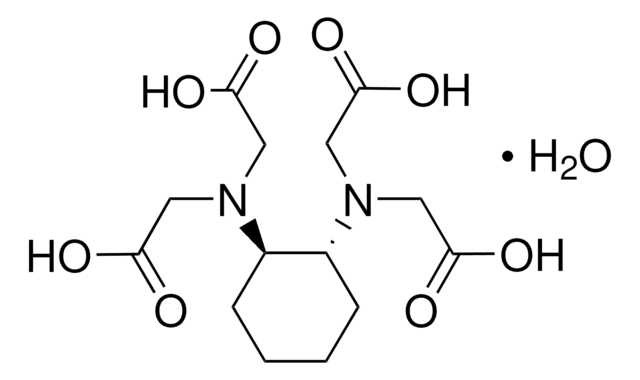1.08452
Ethylenedinitrilotetraacetic acid
Ethylenedinitrilotetraacetic acid. CAS 60-00-4, pH 2.5 (10 g/l, H₂O, 23 °C) (slurry).
Synonym(s):
Ethylenedinitrilotetraacetic acid, EDTA, Edetic acid, Diaminoethane-tetraacetic acid
About This Item
Recommended Products
vapor pressure
<0.013 hPa ( 20 °C)
Quality Level
Assay
99-101% (complexometric)
form
solid
autoignition temp.
>200 °C
potency
2580 mg/kg LD50, oral (Rat)
reaction suitability
reaction type: Complexometric reactions
technique(s)
titration: suitable
pH
2.5 (23 °C, 10 g/L in H2O, slurry)
mp
220 °C (decomposition)
transition temp
flash point >400 °C (DIN 51758)
solubility
water: ~0.5 g/L at 20 °C
density
0.86 g/cm3 at 20 °C
bulk density
600 kg/m3
cation traces
Fe: ≤0.001%
heavy metals (as Pb): ≤0.001%
storage temp.
no temp limit
InChI
1S/C10H16N2O8/c13-7(14)3-11(4-8(15)16)1-2-12(5-9(17)18)6-10(19)20/h1-6H2,(H,13,14)(H,15,16)(H,17,18)(H,19,20)
InChI key
KCXVZYZYPLLWCC-UHFFFAOYSA-N
Related Categories
Application
- Photo-Fenton oxidation of cylindrospermopsin at neutral pH with LEDs.: This study investigates the use of photo-Fenton processes catalyzed by Ethylenedinitrilotetraacetic acid (EDTA) under neutral pH conditions, optimizing reaction parameters for environmental applications (Ortiz et al., 2023).
- Mixtures of chelating agents to enhance photo-Fenton process at natural pH: Influence of wastewater matrix on micropollutant removal and bacterial inactivation.: Research shows how EDTA, when used in combination with other chelators, enhances the efficiency of the photo-Fenton process at natural pH levels for water treatment, focusing on micropollutant degradation and pathogen inactivation (López-Vinent et al., 2021).
- A new route to "bifunctional" chelating agents: conversion of amino acids to analogs of ethylenedinitrilotetraacetic acid.: Describes a synthetic method to transform standard amino acids into bifunctional analogs of EDTA, expanding the utility of these chelators in biochemical and industrial applications (Yeh et al., 1979).
Analysis Note
Identity (IR-spectrum): conforms
in ammonia insoluble components: ≤ 0.005 %
Heavy metals (as Pb): ≤ 0.001 %
Fe (Iron): ≤ 0.001 %
Nitrilotriacetic acid: ≤ 0.1 %
Sulfated ash: ≤ 0.1 %
Water (according to Karl Fischer): ≤ 0.2 %
Signal Word
Warning
Hazard Statements
Precautionary Statements
Hazard Classifications
Eye Irrit. 2
Storage Class Code
11 - Combustible Solids
WGK
WGK 2
Flash Point(F)
Not applicable
Flash Point(C)
Not applicable
Certificates of Analysis (COA)
Search for Certificates of Analysis (COA) by entering the products Lot/Batch Number. Lot and Batch Numbers can be found on a product’s label following the words ‘Lot’ or ‘Batch’.
Already Own This Product?
Find documentation for the products that you have recently purchased in the Document Library.
Customers Also Viewed
Our team of scientists has experience in all areas of research including Life Science, Material Science, Chemical Synthesis, Chromatography, Analytical and many others.
Contact Technical Service






